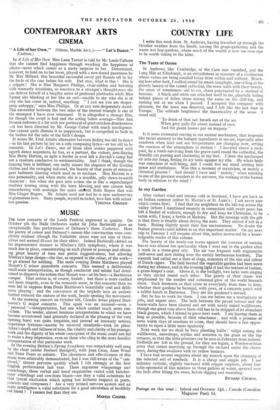MUSIC
THE later concerts of the Leeds Festival improved in quality. On October 5th the Halle Orchestra under Sir John Barbirolli gave an exceptionally fine performance of Debussy's three Nocturnes. Here the poetry of colour and Debussy's mosaic-like construction were com- pletely realised (though the Yorkshire sirens were not sure of them- selves and seemed ill-cast for their roles). Indeed Barbirolli carried on his impressionist manner to Sibelius's fifth symphony, where it was much less in place, concentrating on each phrase or passage and obtain- ing great beauty of tone and poetic suggestiveness, but allowing Sibelius's large design—the line, as opposed to the colour, of the work— to go almost for nothing. The same evening Denis Matthews played Mozart's C minor pianoforte concerto. This seemed a deliberately small-scale interpretation as though conductor and soloist had deter- mined to disprove the notion that Mozart was—at his best—a Beethoven manqué. That notion is, of course, foolish ; but there is more conflict and more tragedy, even in the romantic sense, in this concerto than we were led to suppose from Denis Matthews's beautifully cool and delib- erate playing ; and the conversion of the larghetto into an andante further reduced the stature of the work, beside spoiling the movement.
At the morning concert on October 6th, Claudio Arrau played Beet- hoven's G major concerto. This again was an unusual—even a
personal "—interpretation, but one which carried much more con- viction. The tender, almost feminine interpretation to which we have become accustomed (and generally declared in the phasing of the very opening bars) was quite forgotten, and instead an intensely serious, impetuous lyricism—ascetic by received standards—took its place. Arrau's depth and fullness of tone, the vitality and clarity of his passage- work and the dignity of his whole conception of the music could not fail to make a deep impression, even on those who cling to the more familiar interpretation of this particular work.
In the evening Britten's Spring Symphony was remarkably well sung by the choir (under Herbert Bardgett), with Joan Cross, Anne Wood and Peter Pears as soloists. The cleverness and effectiveness of- this music were admirably demonstrated, but I was still aware of the " con- trived," almost perverse quality which I felt strongly at the first English performance last year. These ingenious whisperings and scratchings, these verbal and tonal exquisitries varied with butcher- boys' whistlings and cow-horn blasts—are they a valid substitute for that lyrical exultation which spring has hitherto inspired in poets, painters and composers ? Are a very refined nervous system and an acute intelligence a valid substitute for a good circulation of healthily red blood ? I cannot feel that they are.
MARTIN COOPER.


















 Previous page
Previous page